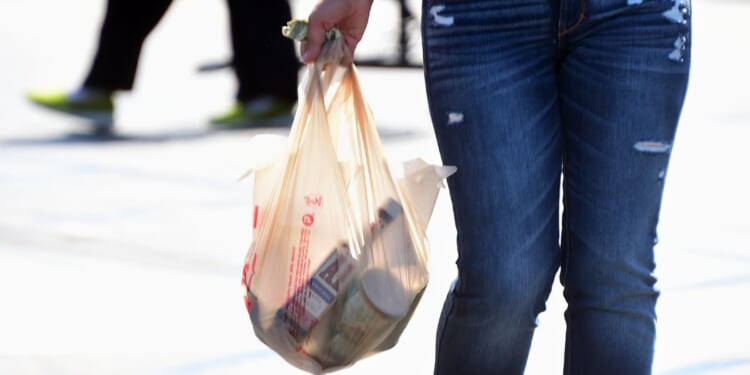After nearly a decade of the law being in place, the plastic bag ban in California seems to have backfired on the West Coast state, as it’s been found that even more plastic waste has been generated than before.
Now, close to nine years after the legislation went into effect in July 2015, plastic bag waste has increased to never-before-seen levels, the Los Angeles Times reported.
The Times cited a report from CALPIRG, a consumer advocacy group, which found there had been a startling increase in the weight of plastic bags discarded in the state — from 157,385 tons in 2015 to 231,072 tons in 2022. That was a massive 47 percent increase in tonnage of discarded plastic bags, despite the law designed to diminish it.
The reason seems to be that the law permitted stores to sell heavier-weight “reusable/recyclable” plastic bags for 10 cents apiece.
That one provision ruined the entire purpose, now generating even more plastic waste than ever before.
Trending:
“It was a conscious decision to create a pathway for a type of reusable bag that barely existed,” Californians Against Waste director Mark Murray told the LA Times.
“It was just emerging in the marketplace, but it happened to be made by a couple of California companies … which the manufacturers claimed they could certify as being reusable,” he added.
But the newer bags — made out of a material called HDPE, which is denser than LDPE, the previous material of plastic bags — turned out to be neither reusable nor recyclable in practical, real-world consumer applications.
“Basically what happened is that plastic bag companies invented these thicker plastic bags that technically meet that definition of reusable but are clearly not being reused and don’t look like reusable bags and which just circumvent the law’s intent,” CALPRIG’s state director Jenn Engstrom said.
Should disposable plastic bags be banned?
Jan Dell, founder of the environmental group The Last Beach Cleanup, told the New York Times that “No bag manufacturer or retailer could show any evidence” of HDPE bags being recycled.
After such a catastrophic failure in reducing plastic waste, California lawmakers are gathering once again to find a new way to tackle the issue.
They’re hoping to pass a new law that will close the loophole and ban bags made out of HDPE — but will that really fix the issue?
Other states have tried similar laws, and have also seen similar failures.
One such state was New Jersey. After they banned single-use plastic bags and allowed the heavier alternative bags, they experienced nearly a threefold increase in plastic consumption for bags, according to a Freedonia Custom Research report cited by Fox News.
It’s undeniable that the release of hundreds of thousands of tons of plastic waste into the environment every year is a major deal, but what can legislators really do? If passing laws is what’s going to fix the issue, why do their laws keep backfiring tremendously?
And why should people trust their government to fix the issue after their last attempt saw a massive move in the wrong direction — a common outcome of government action?
It’s important to move toward a cleaner Earth, but the answer doesn’t lie in passing new laws about how people need to act. Instead, it begins with changing the way that people treat the environment around them and learning to respect the nature that they may have previously harmed.
It’s not a law problem, but a people problem. No change in legislation will suddenly cause those who haven’t cared about the consequences of waste and littering to begin doing so. Only a change to their thinking can do that.
So perhaps California lawmakers should stop passing laws in the name of a greener state. That only works to inconvenience their citizens, especially when the laws wind up having the exact opposite effect of what they intended.













